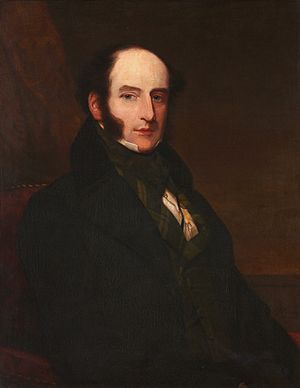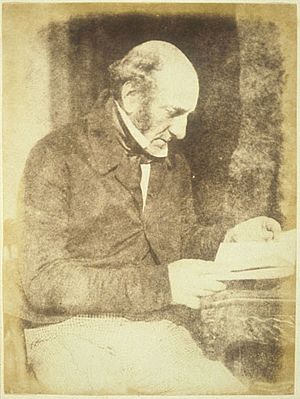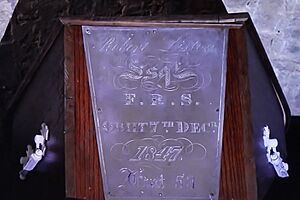Robert Liston facts for kids
Quick facts for kids
Robert Liston
|
|
|---|---|

Liston, 1847 portrait by Samuel John Stump
|
|
| Born | 28 October 1794 Ecclesmachan, West Lothian, Scotland
|
| Died | 7 December 1847 (aged 53) London, England
|
| Alma mater | University of Edinburgh Medical School |
| Scientific career | |
| Fields | Surgery |
Robert Liston (28 October 1794 – 7 December 1847) was a famous British surgeon. He was known for being incredibly fast and skilled. This was important because, back then, there was no pain medicine for operations. Being quick meant less pain and a better chance for patients to survive.
Liston became the first Professor of Clinical Surgery at University College Hospital in London. He also performed the first public surgery in Europe using modern anaesthesia.
Contents
Early Life and Education
Robert Liston was born in Ecclesmachan, a village in Scotland. His father, Henry Liston, was a clergyman and an inventor. His grandfather, also named Robert Liston, was a very important leader in the Church of Scotland.
Robert Liston studied at Edinburgh Medical School starting in 1808. He later worked as an assistant to Dr. John Barclay, a well-known anatomy teacher. In 1816, he went to London to continue his training.
A Surgeon's Journey
After his training in London, Liston returned to Edinburgh. He taught anatomy there and became a house surgeon at The Royal Infirmary of Edinburgh. However, he had some disagreements with other doctors and was dismissed for a while. He was later brought back in 1827.
In 1833, Liston moved to London. He became a professor of surgery at University College Hospital. He was elected a Fellow of the Royal Society in 1841. This is a big honor for scientists.
Passing Away
Robert Liston died on 7 December 1847, at his home in London. He was buried in Highgate Cemetery. Many people, including his family, fellow professors, and former students, attended his funeral.
Liston's Lasting Impact
Robert Liston left behind an important legacy in medicine. In 1837, he wrote a book called Practical Surgery. In it, he stressed how important it was for surgeons to be quick and decisive during operations.
After he died, his friends and admirers decided to create a lasting tribute to him. They planned a marble statue and a special "Liston Medal." This medal would be given out every year to honor his contributions to surgery.
A Fast and Skilled Surgeon

People often described Liston as "the fastest knife." He was known for being able to amputate a leg in less than three minutes! This speed was crucial because, without pain medicine, patients suffered greatly. Being fast also increased their chances of survival.
At that time, doctors didn't fully understand how germs caused infections. Surgeons often wore coats stiff with blood, and cleanliness wasn't seen as important. It was a time when infections were very common after surgery.
Despite the challenges of his era, Liston was known for his strong character. He was kind to the poor and sick, even though he sometimes argued with other surgeons. He was known for successfully operating on patients that other doctors had given up on.
Liston was also a man of strong ethics. In one instance, he questioned a medical colleague about how a young woman was treated. This showed his commitment to doing what was right.
Liston's Medical Innovations
Liston made several important contributions to medicine:
- He became the first Professor of Clinical Surgery at University College Hospital in London in 1835.
- On 21 December 1846, he performed the first public operation in Europe using modern anaesthesia (ether). He famously called it a "Yankee dodge" that was better than other methods.
- This event inspired two of his students: James Young Simpson, who helped develop chloroform as an anesthetic, and Joseph Lister, who pioneered aseptic technique (keeping things germ-free).
- He invented several medical tools, including see-through isinglass sticking plaster and bulldog forceps. He also created a special leg splint still used today for broken bones in the leg.
A Famous (and Unusual) Story
One of the most talked-about stories about Robert Liston is a surgery he supposedly performed. It's often shared as a dramatic example of his speed, though it might not be entirely true.
The story goes that Liston amputated a patient's leg in under two and a half minutes. Sadly, the patient later died from infection. During the same operation, he accidentally cut off the fingers of his young assistant, who also later died from infection. And a doctor watching the surgery was so scared by Liston's fast knife that he fainted and later died from shock!
This tale has been called the only surgery in history with a "300 percent mortality rate." While it's a popular story, there are no clear records to prove it actually happened.
See also
- William Fergusson
- James Syme
- James Simpson
 | Precious Adams |
 | Lauren Anderson |
 | Janet Collins |


